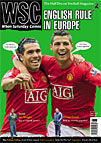 In South Africa, tradition has taken on a whole new meaning as clubs are traded off as franchises as a means of preserving a top flight status, reports Gunther Simmermacher
In South Africa, tradition has taken on a whole new meaning as clubs are traded off as franchises as a means of preserving a top flight status, reports Gunther Simmermacher
A synthetic club will almost certainly be crowned South Africa’s league champions when the season ends in mid-May: Supersport United or Ajax Cape Town. There ought to be widespread jubilation at the failure of South Africa’s Big Three – Orlando Pirates, Kaizer Chiefs and Mamelodi Sundowns – to put up even a token challenge, but, since South African football fans tend to support one of these three, anguish and anger prevail. While the detached observer may enjoy the (doubtless temporary) fall of the giants, for the purist there is little satisfaction in the accomplishments of the two main challengers.
Both Supersport United and Ajax Cape Town came into existence on the back of older clubs, thanks to the franchise system. In the case of the former, the transition was simple. TV channel Supersport – the equivalent of Sky Sports – wanted a presence in the top flight, acquired the established but struggling Pretoria City in 1994, and a little later renamed the club after itself as a marketing gambit. Appropriately, the club’s badge, like the channel’s logo, is the letter S rendered in corporate plastic. Surprisingly, alarm bells failed to ring when the Supersport channel acquired, at an extravagant price, the broadcast rights for Premier Soccer League (PSL) games at the beginning of the current season.
Ajax Cape Town’s genesis is more intricate. In brief, in 1999 the owners of two Cape Town-based PSL clubs sold their franchises in a deal predicated on Ajax Amsterdam’s intent to establish a feeder club in South Africa. The Dutch giants bought the franchise of Seven Stars, a club owned by agent Rob Moore, whose client Benni McCarthy had just left for the Amsterdam side. Seven Stars had finished fifth in 1998-99, their first season in the top flight, but they lacked infrastructure, experience and a fan base. So Moore and AFC Ajax approached John Comitis, owner of Cape Town Spurs, a long-established club who had won the double only four years earlier.
With the new Ajax taking over Seven Stars’ place in the league, the Spurs franchise fell vacant. Seeing no cause to consult his club’s fans, Comitis sold the bare franchise to the highest bidder, which turned out to be controversial businessman Brian Ebden (who had made international news in 2002 when he wrongly accused Alex Ferguson of sexually harassing his girlfriend during a Man Utd tour). Under their new name, Mother City, the club were swiftly relegated.
Ajax Cape Town refer to their founding fuzzily as a “merger”. But Cape Town Spurs, a club with a splendid history and the city’s most loyal fans, were usurped by a polymerised creation who aped Ajax Amsterdam right down to the badge and even team formation. Comitis became joint CEO with Moore at Ajax’s inception. Moore went on to sell his stake in the club.
One might imagine that Spurs supporters would have been outraged at the abrupt extinction of their club, and that Ajax Cape Town would have attracted loathing akin to that fixed on MK Dons in England. But franchise-hopping is a way of football life in South Africa. When, in 2006, the legendary Durban club AmaZulu were relegated, their owners simply traded their franchise with that of the smaller club Dynamos, who had avoided the drop, and carried on in the Premier League as AmaZulu (with Dynamos in the second tier). The price for cheating relegation: about £2 million. Some franchises are effortlessly mobile. The traditional Cape Town club Hellenic morphed into Benoni Premier United in the central Gauteng province, and now operate as Thanda Royal Zulu in Durban.
After Spurs’ death, the natural home for Cape Town’s football fans might have been Santos, an over-achieving club rooted in the city’s working-class community (and the third title challengers this season). But why go for organic when you can have shiny plastic? Most Spurs fans – almost all of them more fanatical about English football than the local variety anyway – unquestioningly transferred their allegiance to Plastic Ajax. It’s about “the tradition”, as a group of them once told me during a derby, without articulating exactly what this tradition involved.
One day the big brothers in Amsterdam may decide that their investment in Cape Town is not paying off and sell the franchise (in nine years, the Ajax partnership has fed a total of one major player to the parent club: Steven Pienaar). And when that happens, the fans will be as disposable as the artificial origins of their club.
From WSC 256 June 2008
Maybe Winklethief could move the MK Plastics to South Africa, sounds like they'd be welcomed with open arms there!